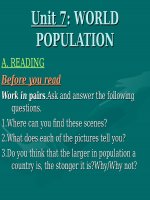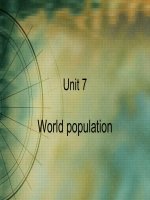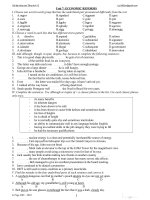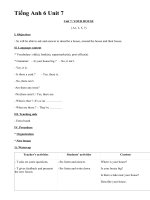Slide tiếng anh 11 unit 7 world population _reading _T.T Thu
Bạn đang xem bản rút gọn của tài liệu. Xem và tải ngay bản đầy đủ của tài liệu tại đây (3.51 MB, 28 trang )
TUA CHUA BOARDING ETHNIC MINORITIES HIGH SCHOOL
UNIT 7: WORLD POPULATION
LESSON 1: READING
TEACHER: TRAN THI THU
Gmail:
MINISTRY OF EDUCATION & TRAINING LAURENCE S’TING MEMORIAL FUND
E – LESSON PLAN COMPETITION
BASIC ENGLISH 11:
January, 4
th
, 2014
What are we facing?
Housing
Water pollution
Water shortage
Traffic jam
Lesson 1: Reading
I. BEFORE -READING: Vocabulary
II.WHILE-READING
1. TASK 1: Gap - fill
2.TASK 2: Answer the questions
III. POST-READING
1. Is this a small or a big family ?
-It is a big family.
2. How many children have they got ?
- 6 ones.
1. Where is this?
2. Are the people in this place rich or poor?
- In a small town.
- They are poor.
(to) increase: tăng
≠
(to) decrease: giảm
(to) raise animals : nuôi động vật
family planning (n): kế hoạch hóa gia đình
Third World (n): Thế Giới Thứ 3
resource (n): nguồn tài nguyên
control (v) /(n) :
điều khiển, kiểm soát/
sự kiểm soát
limit (v) / (n) : hạn chế/ giới hạn
(to) raise animals :
nuôi động vật
family planning (n): kế hoạch hóa gia đình
Third World (n):
Thế Giới Thứ 3
figure (n):
resource (n):
con số
nguồn tài nguyên
birth-control method (n):
phương pháp hạn chế
sinh sản
limit :
hạn chế/ giới hạn
(v)/(n)
control :
(v)/(n) điều khiển, kiểm soát/
sự kiểm soát
(to) increase:
tăng
≠
(to) decrease: giảm
The words in the box all appear in the passage. Fill in
each blank with a suitable word.
limit
control
figures
increases
method
international
although
resources
1. _______ most journalists studied journalism in college, some older
writers never attended a university.
2.Can you explain the ________ for changing salt water to fresh water?
3.The number of injuries from automobile accidents________ every year.
4.Some countries are poor because they have very few natural_______
5.These are all ________: 1, 75, 293.
6. There is a(n) _______of 20 minutes for this short test. Students must
turn in their papers at the end of 20
th
minute.
7. The United Nations is a(n)_______________ organization.
8. Some children behave badly and their parents can’t___________them.
(v, n) (n)
(n)
(v, n)
(v) (adj) (n)
* Task 2: Answer the questions (p.82):
1/. What was the population of the world in
10,000 B.C., 1750, 1850, 1950, and 2000 ?
2/. How many people is the world expected to
have by the year 2015?
3/. Can the Earth have enough resources to
support its population?
5/. Why can’t women in the world limit the size
of their families?
4/. Do most Third World woman want to have a
lot of children?
1. The population of the world in 10,000 B.C was 10
1. The population of the world in 10,000 B.C was 10
million, in 1750 it was 624 million , in 1850 it was
million, in 1750 it was 624 million , in 1850 it was
1,300 million, in 1950 it was 2,510 million, in 1985 it
1,300 million, in 1950 it was 2,510 million, in 1985 it
was 4,760 million, in 2000 it was 6.6 million.
was 4,760 million, in 2000 it was 6.6 million.
2.By the year 2015, the population of the world is
2.By the year 2015, the population of the world is
expected to be over 7 million.
expected to be over 7 million.
3.Some scientists say it can, but others say it can’t.
3.Some scientists say it can, but others say it can’t.
4.No, they don’t.
4.No, they don’t.
5.Because they know of no safe way to have fewer
5.Because they know of no safe way to have fewer
children.
children.
Answer key:
Discussion:
Discuss with a partner and find out five world largest
countries in population. Say where they are and
which is the richest and which is the poorest country.
rank country
Population
(million)
continent
Richest
/poorest
1
China 1,369 Asia
2
India 1,201 Asia
3
USA
304 America
4
Indonesia
232
Asia
5
Brazil
187 America
richest
poorest
1. According to the passage, only of the
earth land can be used for farming?
A) 20 percent
B) 8 percent
C) 10 percent
D) 30 percent
Correct - Click anywhere to
continue
Correct - Click anywhere to
continue
Incorrect - Click anywhere to
continue
Incorrect - Click anywhere to
continue
You answered this correctly!
You answered this correctly!
Your answer:
Your answer:
The correct answer is:
The correct answer is:
You did not answer this
question completely
You did not answer this
question completely
You must answer the question
before continuing
You must answer the question
before continuing
Submit
Submit
Clear
Clear
2. What resources are limited?
A) petroleum and silver
B) iron and gold
C) water
D) all are correct
Correct - Click anywhere to
continue
Correct - Click anywhere to
continue
Incorrect - Click anywhere to
continue
Incorrect - Click anywhere to
continue
You answered this correctly!
You answered this correctly!
Your answer:
Your answer:
The correct answer is:
The correct answer is:
You did not answer this
question completely
You did not answer this
question completely
You must answer the question
before continuing
You must answer the question
before continuing
Submit
Submit
Clear
Clear
3. Most of Third World to
have many children?
A) wish
B) try
C) refuse
D) don't want
Correct - Click anywhere to
continue
Correct - Click anywhere to
continue
Incorrect - Click anywhere to
continue
Incorrect - Click anywhere to
continue
You answered this correctly!
You answered this correctly!
Your answer:
Your answer:
The correct answer is:
The correct answer is:
You did not answer this
question completely
You did not answer this
question completely
You must answer the question
before continuing
You must answer the question
before continuing
Submit
Submit
Clear
Clear
4. In the world's population
was 4,760 million people.
A) 1985
B) 2000
C) 2015
D) 1850
Correct - Click anywhere to
continue
Correct - Click anywhere to
continue
Incorrect - Click anywhere to
continue
Incorrect - Click anywhere to
continue
You answered this correctly!
You answered this correctly!
Your answer:
Your answer:
The correct answer is:
The correct answer is:
You did not answer this
question completely
You did not answer this
question completely
You must answer the question
before continuing
You must answer the question
before continuing
Submit
Submit
Clear
Clear









